What is "Valley Fever"?
Definition
By Mayo Clinic staff
"Valley fever is a fungal infection caused by coccidioides
(kok-sid-e-OY-deze) organisms. It can cause fever, chest pain and coughing,
among other signs and symptoms.
Two species of coccidioides fungi cause valley fever. These fungi are
commonly found in the soil in specific areas and can be stirred into the air
by anything that disrupts the soil, such as farming, construction and wind.
The fungi can then be breathed into the lungs and cause valley fever, also
known as acute coccidioidomycosis (kok-sid-e-oy-doh-my-KOH-sis)".
Mild cases of valley fever usually resolve on their own. In more severe
cases, doctors prescribe antifungal medications that can treat the
underlying infection.
Antelope Valley Dust Storms
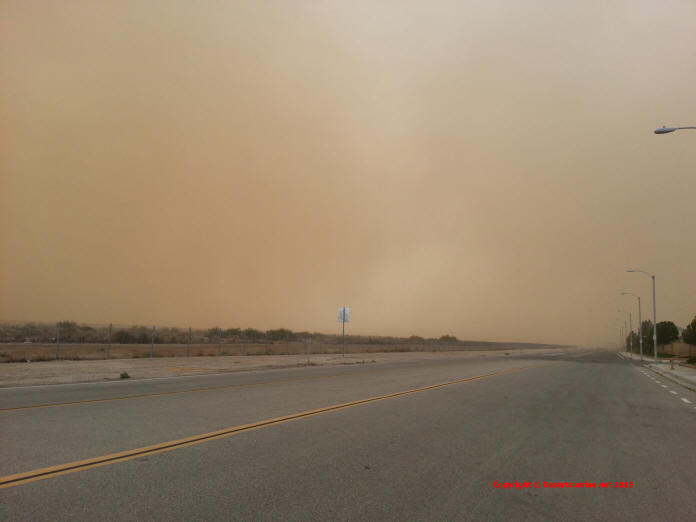
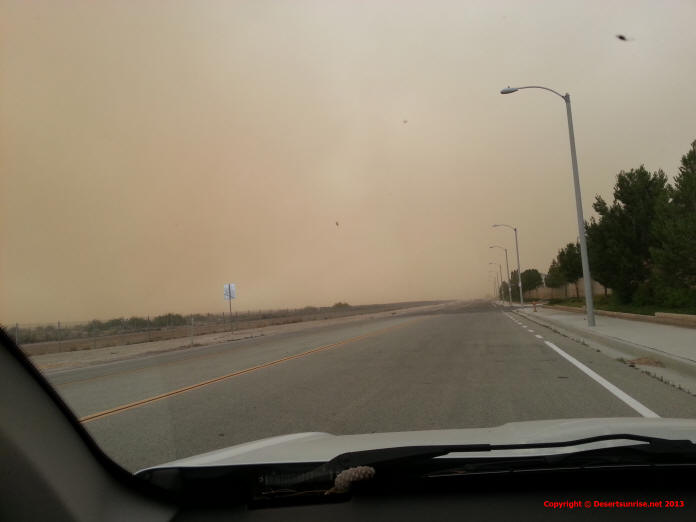
CDC

In a very small proportion of people who get valley fever, the infection can
spread from the lungs to the rest of the body and cause more severe
conditions, such as meningitis or even death. Valley fever cannot spread
from person to person.
Most cases of valley fever in the US occur in people who live in or have
traveled to the southwestern United States, especially Arizona and
California. The map below, “Areas where valley fever is endemic,” was
generated from studies in the 1950s, and shows the areas where the fungus
that causes valley fever is thought to be endemic, or native and common in
the environment. The full extent of the current endemic areas is unknown and
is a subject for further study.
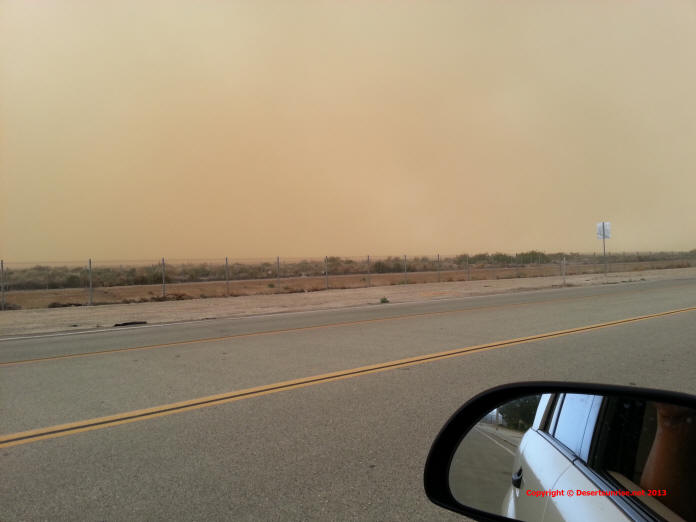
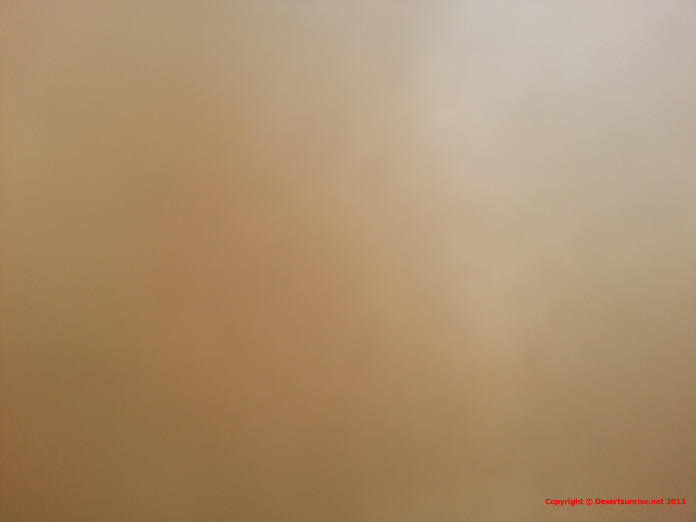
What You Need to Know
Cough??
Fever??Exhausted??
Ask you doctor to test you for Valley Fever. It is difficult to avoid exposure
to the fungus that causes valley fever, and there is no vaccine to prevent
the infection. Therefore, if you have symptoms of valley fever and you live
in or have visited an area where the fungus that causes the infection is
common in the environment, ask your doctor to test you for valley fever. If
you have valley fever, you may need treatment with prescription antifungal
medication.
Research is needed to find out the best treatment for valley fever. Other
research is under way to develop a vaccine to prevent valley fever and to
create better antifungal medications.
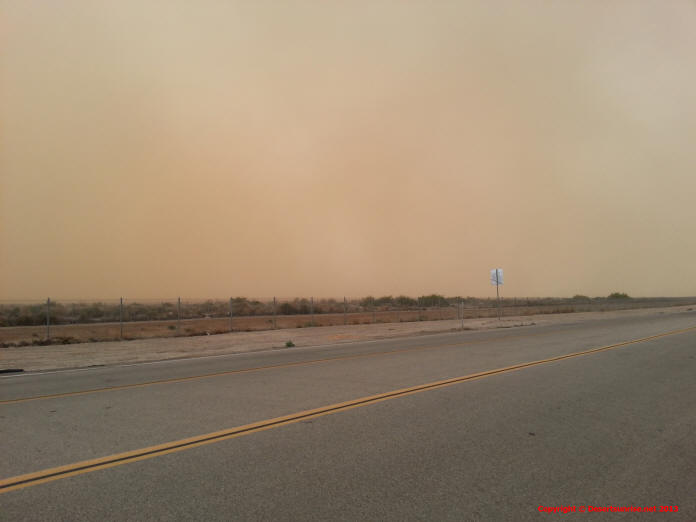
Areas Where Valley Fever is Endemic
Look at the map below. The Antelope Valley is right in the southern "Highly
Endemic Zone"
Coccidioidomycosis was first discovered in the early 1890’s in Domingo
Ezcurra, an Argentinean soldier. Some pathologists believed his skin
conditions were the result of cancer. After tissue biopsies his illness was
thought to resemble the protozoan coccidia, often found in chickens. To this
day the name of coccidioidomycosis still represents this early misdiagnosis.
The Ezcurra case was followed for eleven years and he ultimately died of his
illness.
By 1900 coccidioidomycosis was established as a fungal disease. After an
outbreak in the 1930’s in the San Joaquin Valley of California, this disease
was given its nickname “San Joaquin Valley Fever,” often shortened further
to “Valley Fever.” The disease threatened national security during World War
II when thousands of American soldiers became sickened while training in the
Southwest. It even affects our military today -- as seen during a 2002 Navy
Seal training exercise in California when 45% of the squad fell ill. There
is still no cure for coccidioidomycosis and no vaccine, but we are working
to change that. Be a voice for action!
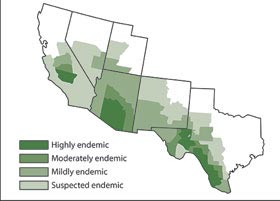
The Antelope Valley has seen some recent heavy construction of 2 large
solar power plants in the West area north of the 138 Hwy (Ave. D). Also
continued construction of homes is causing even more soil disturbance.
But probably the largest cause of recent outbreaks of Valley Fever migh be
caused by the large number of farmlands that are now being abandoned due to
loss of water rights and the general decline of farming in the USA as a
whole.
So remember when you see a dust storm like the one pictured above, take
cover indoors, close windows, doors, garage doors and turn on the AC or
swamp cooler if it is hot weather. Do this until the dust storm ends.
Another Underlying Cause
Another reason why so much desert soil disturbance is seen today along with
the rise in Valley Fever compared to just 40 years ago is due to the massive
Population Increase in many of the Western desert states. This has lead
to huge housing complexes sprouting up in the desert like weeds after a
heavy rain.
Yes, people want to own their own home. People want new safe neighborhoods
(oxymoron statement, new does not always get you "safe") and virtually the
only available large flat land is in the desert. It is not just houses and
strip malls that are causing the desert soil to be disturbed. All those new
homes, skyscrapers in Los Angeles, Las Vegas, Phoenix need electricity!
At one time the West received a large portion of it's electricity from the
river damns and a few nuclear power plants along the coal fired electric
power plant in Page, AZ (Navajo Generating Station). But now with a smaller
snowfall in the mountains many of the power generating damns are scaling
back production. And now California's only Nuclear power plant is being shut
down. Where are all these massive new sprawling suburbia's going to get
electricity for can openers, Air Conditioning units, 60 inch TV screens and
PC's so we can read this fellows web pages?
Solar and Wind to the rescue!









